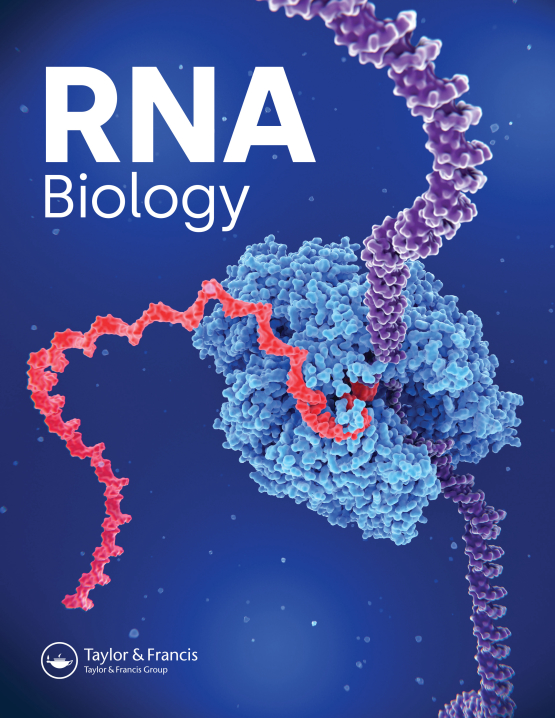Submit a Manuscript to the Journal
RNA Biology
For an Article Collection on
Post-transcriptional Gene Regulation in Plants (PGRP)
Manuscript deadline
16 August 2024

Article collection guest advisor(s)
Dr. Julio Sáez-Vásquez,
Laboratoire Génome et Développement des Plantes, UMR 5096 CNRS-UPVD, France
[email protected]
Dr. Martin Crespi,
Institute of Plant Sciences Paris-Saclay (IPS2), Universités Paris-Sud, France
[email protected]
Dr. Zofia Szweykowska-Kulińska,
Adam Mickiewicz University, Poland
[email protected]
Post-transcriptional Gene Regulation in Plants (PGRP)
In all eukaryotic cells Post-transcriptional Gene Regulation (PTGR) of coding and non-coding RNAs (ncRNA) is critical to maintain functional and/or structural activities of these RNAs. PTGR includes among others, splicing and polyadenylation of mRNA, processing of ncRNA, epi-transcriptomic modifications, RNA degradation and suitable cellular localizations.
In plants, PTGR mechanisms play a major role in plant growth and development and in response to abiotic stress and plant defence. PTGR of mRNA, tRNA and rRNA control translation activity and subsequently production of specific proteins. Furthermore, PTGR and more specifically RNA modifications of small nuclear (snRNA) and nucleolar (snoRNA) RNAs can affect splicing/processing and/or modifications of other ncRNAs. Much less is known about PTGR of specifically expressed lncRNA and how they might regulate gene expression, RNA degradation, mRNA splicing and translation. Globally, these PTGR changes may lead to the synthesis of diverse proteins from the same gene affecting their localization or potential post-translational modifications. Lastly, PTGR of specific nuclear RNAs is also required for accurate assembly of functionally active ribonucleoproteins in the nucleoplasm and in the nucleolus.
This collection of RNA Biology aims to gather information on PTGR in Plants (PGRP). Structural, biochemical and functional aspects of both coding and non-coding RNAs and the interconnections of these RNAs with plant growth and development and response to biotic and abiotic stress will be considered. Selected research papers, technical communication and reviews presenting and discussing cutting-edge RNA research in plants will undergo a full peer-review.
All manuscripts submitted to this Article Collection will undergo a full peer-review; the Guest Advisors for this collection will not be handling the manuscripts. Please review the journal scope and author submission instructions prior to submitting a manuscript.
The deadline for submitting manuscripts is August 15th, 2024.
Please contact Ashley Ambros at [email protected] with any queries regarding this Article Collection.
Article Collection Guest Advisors
Dr. Julio Sáez-Vásquez: The research of my team is focused on RNA processing and ribosome assembly during plant growth and development and in response to environmental conditions. We characterize molecular clues controlling RNAse III like activities and investigate rRNA transcription and co-transcriptional modifications and how these modifications affect ribosome translation fidelity and tuning in the plant model Arabidopsis thaliana.
Dr. Martin Crespi: My group work on the action of non-coding RNAs, both small and long, in the regulation of root plasticity, a trait largely responsive to the soil environment. In the last years, we have studied the molecular mechanism involving specific long non-coding RNAs in the interaction with chromatin and its 3D conformation as well as on the regulation of alternative splicing.
Dr. Zofia Szweykowska-Kulińska: My group is working on microRNA biogenesis and function in plants. These are key regulators of gene expression affecting plant development and response to environmental cues. Specifically early stages of microRNA biogenesis are studied like effects of splicing, polyadenylation and modifications on the level of mature Arabidopsis microRNAs. Role of selected microRNAs is studied in barley in response to heat and drought stresses.
Disclosure statement: The Guest Advisors have no conflicts to disclose related to this work.
Benefits of publishing open access within Taylor & Francis
Global marketing and publicity, ensuring your research reaches the people you want it to.
Article Collections bring together the latest research on hot topics from influential researchers across the globe.
Rigorous peer review for every open access article.
Rapid online publication allowing you to share your work quickly.
Looking to Publish your Research?
Find out how to publish your research open access with Taylor & Francis Group.
Choose open accessSubmission Instructions
All manuscripts submitted to this Article Collection will undergo desk assessment and peer-review as part of our standard editorial process. Guest Advisors for this collection will not be involved in peer-reviewing manuscripts unless they are an existing member of the Editorial Board. Please review the journal Aims and Scope and author submission instructions prior to submitting a manuscript.